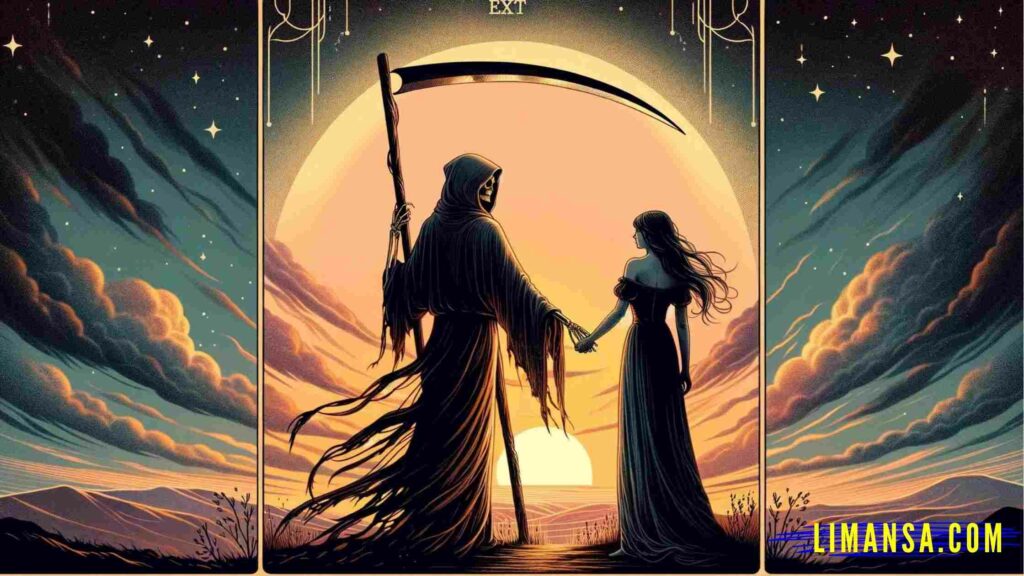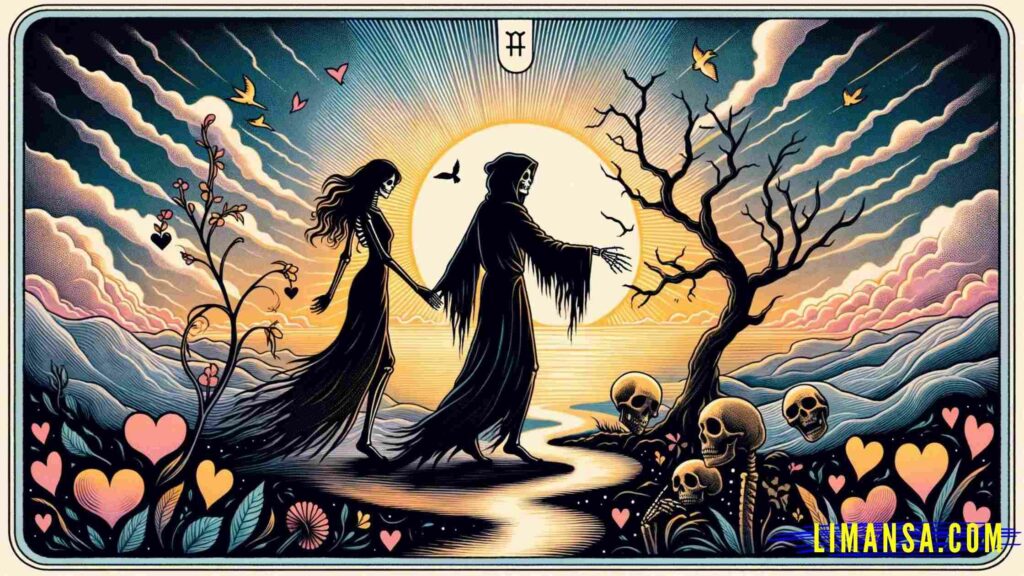
What does the Death Tarot card signify when it comes to the question, “What someone thinks of you?”
In its upright position, the Death card symbolizes transformation, endings, and the beginning of new cycles. It suggests that the person thinks you are undergoing significant change, shedding old aspects of yourself to embrace new opportunities and perspectives. They see you as someone navigating through a period of transition, possibly reinventing yourself or your life’s direction.
When the Death card is reversed, it may indicate resistance to change or a struggle to let go of the past. This person might think you are clinging to outdated beliefs or relationships, hindering your growth and transformation. In their eyes, you might be perceived as someone who needs to release the old to make way for the new but is finding it challenging to do so.
Upright Death as What Someone Thinks of You
● New Relationships: When the upright Death card appears concerning new relationships, it suggests that they think of you as a catalyst for positive change.
This person sees you as someone who brings a refreshing perspective, much like a revitalizing breeze after a stifling heat.
Your presence is perceived as the dawn of a new era, where old patterns are shed, and exciting possibilities emerge.
To them, you embody the essence of transformation, inviting a journey towards uncharted territories of connection and understanding.
Your ability to embrace change is seen as a virtue, making you a valuable companion in the adventure of life.

● Existing Relationship: In the context of existing relationships, the upright Death card reflects the view that you are a dynamic force for growth and renewal.
This person thinks of you as someone who nurtures the relationship’s evolution, always seeking to deepen the bond and enrich the shared experience.
Your approach to the relationship is like tending a garden, where you continuously work to remove the weeds of complacency and water the seeds of progress.
They appreciate your commitment to keeping the relationship vibrant and alive, recognizing your role in fostering an environment where both partners can flourish and transform together.
● Ex-Relationships: Regarding ex-relationships, the upright Death card suggests that they think of the relationship’s conclusion as a pivotal moment of transformation.
This person likely sees the end not as a loss but as a necessary phase of growth that benefited both parties.
They may view the relationship as a chapter that, while closed, has left an indelible mark of positive change on their life.
The mutual experiences and challenges faced are acknowledged as stepping stones that have led to personal development and a deeper understanding of self and relationships.

Reversed Death as What Someone Thinks of You
● New Relationships: In new relationships, a reversed Death card might raise concerns that this person thinks you are holding onto the past.
They could feel that unresolved issues or lingering attachments are casting a shadow over the potential for a fresh beginning.
This perception might worry them, fearing that the baggage you carry could hinder the growth of a healthy, forward-moving relationship.
They might see the need for a clearing of old emotional clutter to pave the way for a genuine new start, where both individuals can fully invest in what’s to come without the restraints of what has been.
● Existing Relationships: When the reversed Death card appears in the context of existing relationships, it may indicate worries that you are seen as resistant to change.
This person might think you are clinging to the comfort of the known, even when it leads to stagnation or the recycling of old issues.
Your reluctance to embrace necessary transformations could be perceived as a barrier to the relationship’s progress, suggesting a need for open communication and a willingness to navigate the uncertainties of growth together.
The fear is that without addressing these challenges, the relationship might struggle to evolve and reach its full potential.

● Ex-Relationships: From an ex-partner’s perspective, the reversed Death card could imply that they think you have not fully moved on.
It suggests that they believe unresolved feelings or issues linger, preventing true closure and personal transformation.
This perception might lead them to feel that the relationship, although ended, still has unresolved chapters that need attention.
The hope might be for a process of introspection and healing to take place, allowing both individuals to fully embrace their separate paths and the growth that comes from having experienced and concluded their shared journey.
Actionable Advice
● New Relationships:
- Upright Death: Embrace the transformative potential within this new connection. Be open to shedding old patterns and welcome the growth that this new relationship brings.
- Reversed Death: Reflect on past relationships and ensure that you have truly moved on. Entering a new relationship with a clear slate will allow for healthier dynamics to unfold.
● Existing Relationships:
- Upright Death: Encourage and initiate conversations about growth and change within your relationship. Embrace transitions as opportunities for deepening your connection.
- Reversed Death: Work together to identify areas where change is needed. Acknowledging and releasing outdated patterns or grievances can rejuvenate your relationship.

● Exs:
- Upright Death: View the end of the relationship as a transformative period for personal growth. Take the lessons learned to heart, allowing them to shape a more fulfilling future.
- Reversed Death: Seek closure if unresolved feelings linger. This may involve self-reflection or a conversation to express and release any lingering ties to the past.
Conclusion
The Death card, with its profound symbolism of endings and new beginnings, offers a unique lens through which to view how others perceive us in the context of change and transformation.
Whether upright or reversed, understanding the Death card in terms of what someone thinks of you invites a deep exploration of personal growth and the dynamic nature of our relationships.
By embracing the lessons this card offers, we can navigate life’s transitions with greater awareness and openness, fostering more meaningful connections and personal evolution.
